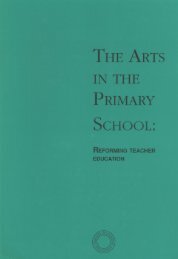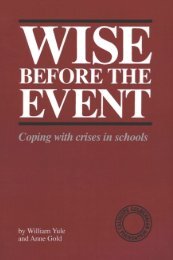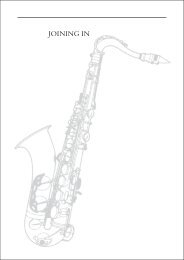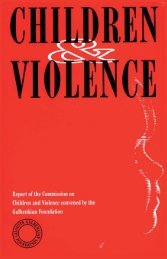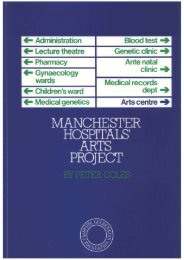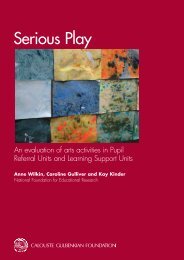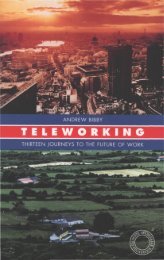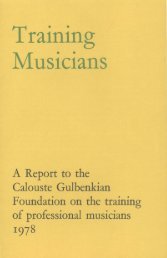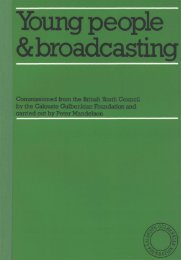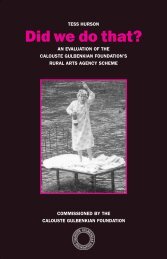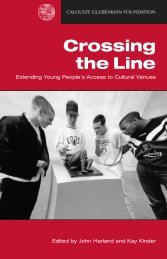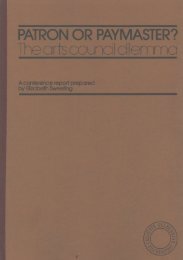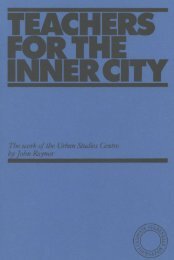The Arts in Schools - Calouste Gulbenkian Foundation
The Arts in Schools - Calouste Gulbenkian Foundation
The Arts in Schools - Calouste Gulbenkian Foundation
- No tags were found...
Create successful ePaper yourself
Turn your PDF publications into a flip-book with our unique Google optimized e-Paper software.
it is likely that more children will be found to reveal artisticgifts and talents requir<strong>in</strong>g nourishment. Third, gifted childrenrema<strong>in</strong> widely misunderstood or ignored as a category.We do not accept the charge of elitism <strong>in</strong> this contextbecause we are not postulat<strong>in</strong>g the gifted versus the nongifted.All children may have gifts of some k<strong>in</strong>d. <strong>The</strong>se needto be discovered and developed to the best of their, and our,ability. Thus there are two dimensions to the question ofgifts and talents at school:a how to <strong>in</strong>crease general exposure to the arts and theopportunity to enjoy and participate <strong>in</strong> them to anextent that we can say the educational process genu<strong>in</strong>elyprovides an opportunity for gifts and talents to revealthemselves <strong>in</strong> every area at every social level? <strong>The</strong>solution to this problem is implicit <strong>in</strong> our considerationof the arts and the curriculumb hav<strong>in</strong>g provided this opportunity, how best to identifygifts and talents and encourage their development?166 Help<strong>in</strong>g No firm l<strong>in</strong>e can be drawn between the gifted and talented.gifts and All the more important, therefore, that local educationtalents: the authorities should create the circumstances at authority androles of the at school level with<strong>in</strong> which the artistic talents of all youngschool people can be encouraged.100a Identification<strong>The</strong> very gifted frequently identify themselves at anearly age. Others need the help of identification byparents, relatives or teachers. It is the school's job to beable to recognise such gifts and talents and to arrangeappropriate support with help from parents and thelocal education authority. To help <strong>in</strong> this the Devoneducation authority, for example, now provides guidance<strong>in</strong> identification and has established two centres towhich primary-age children, thus identified, can go forhalf a day a week for extra tuition.b Extra tuitionIn the later years of primary education and throughoutsecondary education children gifted <strong>in</strong> the arts willneed special tra<strong>in</strong><strong>in</strong>g <strong>in</strong> their art and special arrangementsto balance this tra<strong>in</strong><strong>in</strong>g aga<strong>in</strong>st the demands of generaleducation. Such arrangements <strong>in</strong> ord<strong>in</strong>ary schools may<strong>in</strong>clude, dropp<strong>in</strong>g some subjects to provide more time topractise a particular skill, or time off for specialisttuition.<strong>Arts</strong> specialists seem undecided whether this tra<strong>in</strong><strong>in</strong>gcan be best given with<strong>in</strong> the ord<strong>in</strong>ary school system or



